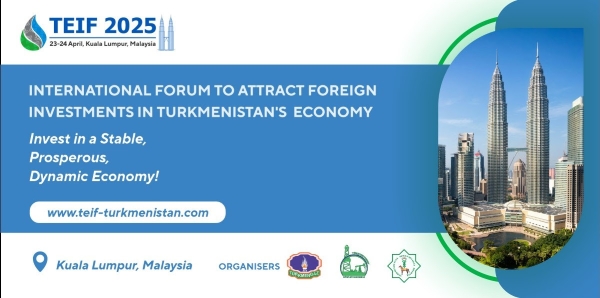At the International Forum on Attracting Foreign Investments to Turkmenistan’s Economy (TEIF 2025) in Kuala Lumpur, Ms. Valerie Ducrot, Executive Director of the Global Gas Centre, participated in a panel discussion (Session 5) titled “The Role of Clean Energy in Creating a Sustainable Future: Reducing Methane, CO2 Emissions, and Monetisation.”
Valerie Ducrot is the Executive Director of the Global Gas Centre (GGC), a non-profit organization founded in 2014 and based in Geneva, whose main objective is to share best practices and experience among gas industries. Valérie was previously the Manager of UNECE Gas Centre from 2009- 2014, and has occupied several positions at the French energy company ENGIE. Throughout her career, she has gained a large experience in the gas sector at a worldwide level.
Her remarks, derived from vast background from the private sector and the UN, offered a pragmatic perspective on the evolving energy landscape, emphasizing the critical role of natural gas and the need for a balanced approach to energy transition.
Moving Beyond the Fossil Fuels vs. Renewables Divide
Ducrot highlighted the shifting narrative around energy sources, noting that the past focus on renewables often cast fossil fuels as the primary culprits of environmental degradation. However, recent geopolitical and political challenges have ushered in a more pragmatic era. “We have to stop splitting the world between renewables, fossil fuels, and nuclear,” she stated. “We need everything.”
With rising global energy demand, particularly in regions lacking access to electricity or relying on high-pollution fuels like coal, Ducrot argued that “we need everything and with the rising energy demand for those who don’t have access to electricity”.
From powering maritime transport to meeting industrial needs, a diverse energy mix—including nuclear, fossil fuels, renewables, and emerging fuels—is essential to address global energy challenges.
Natural Gas: A Cornerstone of the Energy Transition
Ducrot underscored the pivotal role of natural gas and liquefied natural gas (LNG) in the energy mix for decades to come. As a lower-carbon fossil fuel, natural gas serves as a bridge to a greener future, offering a viable alternative to coal and oil. She emphasized that the focus should not be on excluding specific commodities but on reducing emissions across all energy sources. “All we need is to reduce the emissions and it’s a political commitment to do something, but we don’t have to exclude this or that commodity, but we need to invest in the right technologies”, she stressed.
“Finally the World Bank has recognized the role of natural gas in the future and we need to continue to invest in infrastructure of these commodities,” Ducrot noted, advocating for continued investment in infrastructure to support this commodity.
For many countries, the challenge lies in monetizing their natural gas resources to find new markets and invest in cleaner technologies. By greening the entire gas value chain—from extraction to distribution—nations can align with global sustainability goals while meeting energy demands.
Investing in Technology for a Greener Future
A key theme of Ducrot’s remarks was the importance of investing in the right technologies to reduce emissions. Rather than prescribing specific energy sources, she called for a political commitment to innovation and emissions reduction.
Ducrot’s message was clear: the energy transition requires a collaborative and inclusive approach. By moving away from divisive rhetoric and embracing all available energy sources, the global community can address rising energy demands while advancing environmental goals. Her call to move beyond the fossil fuels vs. renewables debate underscores the importance of unity and innovation in building a sustainable future.
Her remarks at TEIF 2025 resonate with the broader objectives of the forum, which seeks to foster international partnerships and attract investments to support sustainable development. ///nCa, 24 April 2025
